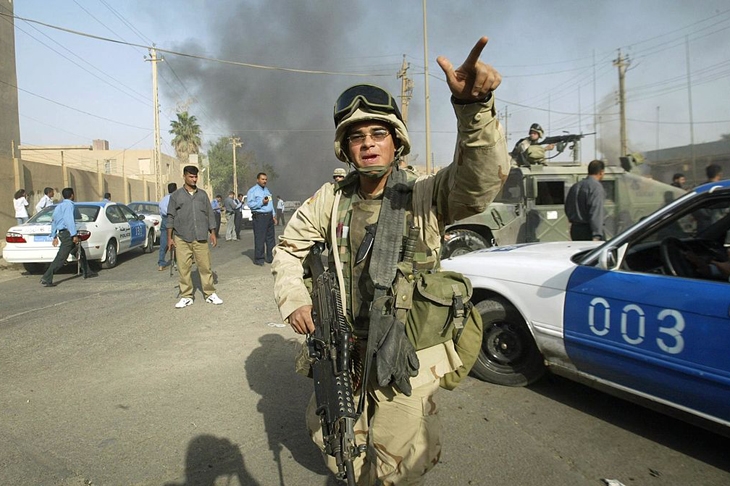The BBC foreign correspondent Hugh Sykes was meant to be talking about how music has shaped his life with Sarah Walker on Essential Classics last week (Radio 3, Friday), but their conversation actually gave us far more crucial insights into why he has won awards for his work, reporting from troubled places such as Tehran, Baghdad, Belfast, Berlin and Islamabad. He stressed the importance of checking your facts, ‘Verify, verify, verify’, and especially now that the demand for instant news coincides and conflicts with the torrents of information flooding the internet. ‘Never report anything until you’ve got at least two sources,’ Sykes insisted. He also explained how easy he found it to get people talking. ‘I’m holding a microphone. I ask a question. They answer. And they go on talking, and I don’t have to do very much.’
Here, I suspect he was being modest. ‘You have to be engaging. You have to be friendly. You have to trust people. Above all, you must never be afraid of them,’ he said, adding, ‘If you’re afraid of someone without very good reason, it’s an insult.’ This was not an obvious observation, and far more meaningful because of it.
What makes Sykes stand out as a radio reporter is his acute eye and his empathic understanding of what details are needed to tell a story, never overloading his reports with adjectives or emotion but finding just the right image to make what he is saying stick in the mind. In Iraq, for instance, from where he has been reporting since the 2003 invasion by British and US troops, and which he loves as a place and as a people, he was on his way to a polling station to witness the first democratic election since the fall of Saddam Hussein. Just a few minutes earlier a suicide bomber had attacked and when he arrived (taken there by American forces in a heavily defended Humvee) the street was ‘covered with pieces of human beings and in the middle of the road was the suicide bomber’s head’. He watched, he said, as a woman dressed in black came out of one of the houses carrying a cardboard box which had marked on it in English: ‘Apples’. She put it over the head, ‘to give it some dignity and hide it, so the children couldn’t see it’.
This daily weekday slot of conversations with ‘personalities’ about music can seem like a wasted opportunity. Too much inconsequential chatter without enough about the music. But with Sykes as a guest the extra time (almost an hour and a half of conversation laced with the chosen guest’s music) didn’t matter because everything he said was so purposeful — listening to Beethoven played by a youth band outdoors on a sweltering hot evening in Erbil, looking out of the window as a boy in Tehran (his father was British ambassador) and seeing his mother’s piano covered in snow, or his mother’s memory of a lunchtime in the British Embassy (where her father was ambassador) in 1930s Berlin. ‘I’m sorry I’m late,’ said her father, ‘but I’ve just been to see Herr Hitler again. The next time I go and see him I should take a pistol….’
Over on Radio 4, one of Sykes’s foreign-correspondent colleagues, Wyre Davies, was also talking about music, this time in Paraguay, which Davies helpfully explained (‘Not many, I suspect, know exactly where it is’) is nestled between Brazil and Argentina, in the heart of South America. In Tunes from the Trash on Saturday (produced by Martin Williams), Davies went to meet the founder of La Orquesta de Instrumentos Reciclados de Cateura, where all the players are young people living in slum conditions, whose families survive by recycling rubbish from the landfill site that dominates their home. Their instruments, too, are all made out of rubbish. Drums with discarded X-rays used as the skin, cellos made out of oil cans, a violin created from a paint can, bits of old wood, the heels from a pair of women’s shoes and some old plastic. Only the strings are ‘professionally’ made.
Favio Chavez explained that he had arrived in Cateura (on the outskirts of the Paraguayan capital Asuncion) as an environmental technician, with plans to clean up the sewage, the rubbish, the threat of flooding from the river that runs through it. When the project failed he turned to his love of music for a solution and now says, ‘I’ve achieved with music what couldn’t be done with technical help.’ They’ve built a music school within sight of the landfill site, and the orchestra now tours the world giving concerts of Bach, Beethoven, Pachelbel. Yet all the instruments are still made out of rubbish and the young players still live in Cateura.
‘Through the orchestra,’ says Chavez, ‘through culture… we can vindicate the people who’ve been discarded by society.’ He wants his players to stick with their recycled instruments as a way of showing that everything has a value and that a beautiful sound can be produced from old bits of trash. ‘The world sends us rubbish… we send it back music.’






Comments